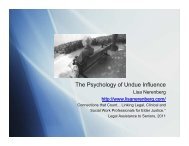Undue Influence: Definitions and Applications - California Courts ...
Undue Influence: Definitions and Applications - California Courts ...
Undue Influence: Definitions and Applications - California Courts ...
You also want an ePaper? Increase the reach of your titles
YUMPU automatically turns print PDFs into web optimized ePapers that Google loves.
More recent law is contained in <strong>California</strong> Welfare <strong>and</strong> Institutions Code §15610.30 et<br />
seq., which address financial abuse of an elder or dependent adult. In 2009, that section <strong>and</strong><br />
others in the Welfare <strong>and</strong> Institutions Code were amended. The term undue influence was<br />
added. Section 15610.30(3) of the <strong>California</strong> Welfare <strong>and</strong> Institutions Code now states that<br />
financial abuse of an elder or dependent adult occurs when a person or entity does any of the<br />
following: “Takes, secretes, appropriates, obtains, or retains, or assists in taking, secreting,<br />
appropriate, obtaining, or retaining, real, or personal property of an elder or dependent adult<br />
when the elder or dependent adult lacks capacity pursuant to Probate Code §812, or by undue<br />
influence, as defined in Civil Code §1575, or both.” Thus, undue influence is legally related to<br />
financial abuse. Section 15657.6 of the Welfare <strong>and</strong> Institutions Code—which references an<br />
elder lacking capacity (pursuant to <strong>California</strong> Probate Code §812) or being of unsound mind, but<br />
not entirely without underst<strong>and</strong>ing—states that a person or entity must return real or personal<br />
property if the elder or the elder’s representative dem<strong>and</strong>s it. Failure to do so in a timely fashion<br />
subjects the perpetrator to the same remedies available for financial abuse, namely, damages,<br />
attorney’s fees, <strong>and</strong> costs.<br />
Although the <strong>California</strong> Probate Code does not contain a definition of undue influence, it<br />
does contain specific information as to determining deficits in mental functions in §811 <strong>and</strong> the<br />
capacity to make decisions in §812. These statutes may prove helpful in crafting legislation<br />
pertaining to undue influence <strong>and</strong> are discussed later in this report.<br />
In her analysis of <strong>California</strong> law related to undue influence, Welden-Smith (2009)<br />
(Appendix B) focuses on will contests. She offers an approach to the lack of a definition of<br />
undue influence in the <strong>California</strong> Probate Code. While it is based on undue influence in the<br />
context of wills <strong>and</strong> not living people, it is instructive <strong>and</strong>, as will be seen later in this report,<br />
adaptable to a larger view of undue influence <strong>and</strong> possible construction of a statutory definition<br />
of undue influence for the Probate Code (Nerenberg, 2010) (Appendix C). Welden-Smith sets<br />
out a four-factors model:<br />
(1) The person who made the will suffered from mental <strong>and</strong>/or physical conditions that<br />
could permit his freedom of will to be overcome;<br />
8




